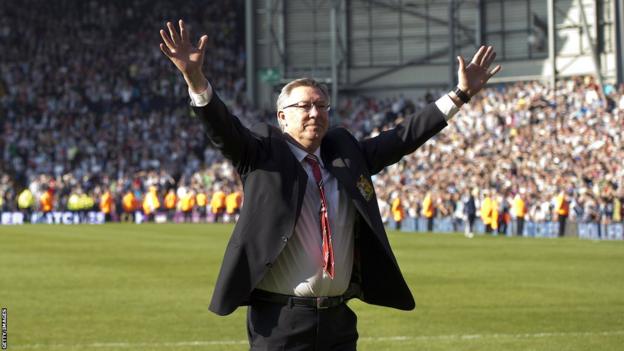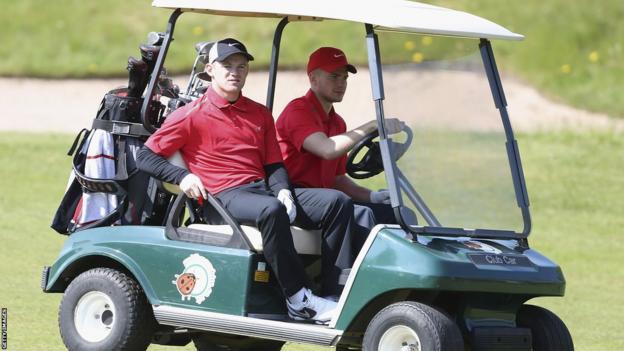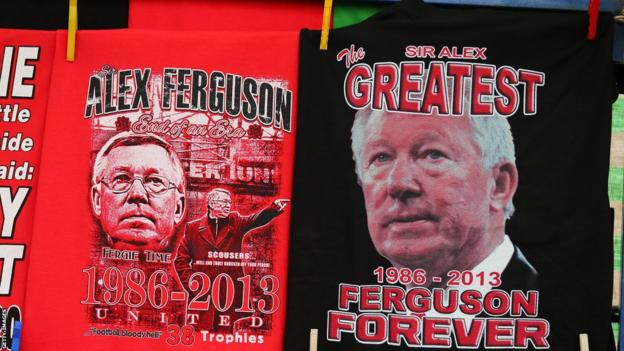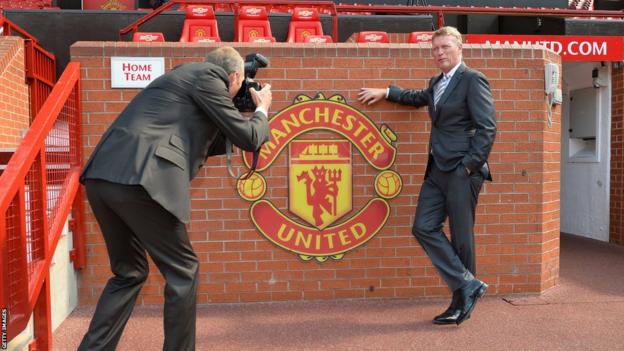Sir Alex Ferguson retires: A secret that couldn't be contained - the inside story of Manchester United boss' exit
Monday, 8 May 2023 marks 10 years since the seismic news of Sir Alex Ferguson's retirement was confirmed by Manchester United.
The story broke in the media on the night before the official announcement, despite the extraordinary lengths United went to try and keep it secret.
A decade on, it could be argued the club still hasn't recovered from Ferguson's exit.
The Scot remains the most decorated manager in British football.
He won 13 Premier League titles, five FA Cups, four League Cups, two Champions Leagues, a European Cup Winners' Cup, a European Super Cup, an Intercontinental Cup and a Fifa Club World Cup during his time at Manchester United.
Add to that the three Scottish titles, four Scottish Cups, Scottish League Cup, European Cup Winners' Cup and European Super Cup he won as manager of Aberdeen.
Now 81, in his autobiography 'Alex Ferguson', he detailed why he decided to quit after nearly 27 years in one of the game's toughest and most high-profile jobs.
'"I'm going to retire," he told wife Cathy, around Christmas 2012.
'"Why are you going to do that," she replied.
"Cathy, who had lost her sister Bridget in the October and was struggling to come to terms with that bereavement, soon agreed it was the right course. Contractually, I was obliged to tell the club by 31 March if I was going to stand down that summer," wrote Ferguson.
So set in motion the wheels for Ferguson's departure. It was also the beginning of an attempt to keep one of the biggest stories of the Premier League era under wraps at perhaps its most-scrutinised club.
BBC Sport has spoken to a number of sources around United at that time for an insight into the process that ended with an amazing 5-5 draw in Ferguson's last game as a manager at West Brom on 19 May.
The Real Madrid clue
Ferguson told United chief executive David Gill of his plans early in 2013.
Gill had initially called their meeting to tell Ferguson of his own departure.
Having worked closely with Ferguson for more than a decade, Gill wanted the manager to be among the first to know he intended to stand down the following summer, hoping a lack of club ties would improve his chances of taking a seat on Uefa's powerful executive committee.
However, Gill was surprised to hear Ferguson reveal that the current season would also be his last at Old Trafford.
The news stayed secret for months.
Long after the 31 March deadline passed, only a select few, including United's owners, the Glazer family, knew of Ferguson's impending exit.
However, looking back, there was a giant clue.
On 5 March, United were knocked out of the Champions League in controversial fashion by Real Madrid. They had been ahead in the tie when United winger Nani was sent off. On the touchline, Ferguson was furious.
When the teams returned to the dressing room, Gill went to speak to Mike Phelan, Ferguson's assistant.
Phelan had been Ferguson's regular stand-in for post-match interviews with the BBC during the manager's seven-year boycott of the broadcaster over a disputed documentary about his son Jason.
In addition, the only time the United manager conducted the separate post-match media conferences was after European games when it was a contractual requirement.
Despite the magnitude of the game and the unprecedented nature of the request in a European context, Gill told Phelan that he would have to take the place of an upset and angry Ferguson in front of the media. Ferguson said the same.
The feeling was Ferguson might say something he would regret.
Phelan told the media Ferguson was "distraught" and "in no fit state" to talk to them.
What Ferguson and Gill knew, but neither Phelan nor anyone in the media were aware of, was that the loss signalled the end of the manager's final chance to lift the trophy he coveted the most once more.
His combination of rage and incredulity at the performance of Turkish referee Cuneyt Cakir was heightened by the knowledge there could be no chance of redemption. In Champions League terms, it was the end.
Putting a plan in place
It wasn't until early April that the circle of trust was widened.
Even then, it extended to no-one other than those who, for operational reasons, had to know about Ferguson's departure and, crucially, could be trusted.
A couple of weeks later, on 22 April, United secured the title when Robin van Persie scored a hat-trick in a 3-0 win against Aston Villa.
Van Persie had been recruited from Arsenal the previous summer, having received personal assurances from Ferguson that he had no plans to stand down.
But the Scot had changed his mind and that title success paved the way for a plan to be put in place.
It was not a given at that time United would arrange an open-top bus parade to celebrate winning the Premier League.
They famously didn't have one after winning the Premier League and Champions League in 2008, nor the following season when they won the Premier League title and reached the Champions League final.
However, on the basis Manchester City had celebrated their own success 12 months earlier with a parade, nothing seemed too unusual in United saying they wanted one as well.
Those at the club with responsibility for marking key moments were told to push the boat out. It was, after all, they were told, a milestone 20th championship. Behind that push lay the knowledge it would also be marking Ferguson's last.
Still, hardly anyone knew the reality. The announcement of Ferguson's departure was set for the morning of Wednesday, 8 May.
On the Tuesday morning, a meeting was called for various staff members.
They were told to prepare for a big announcement, as big as it was possible to be, for the following morning. The tone of the conversation was to steer people towards believing it was transfer or sponsorship related.
But, at the end of the meeting, a lone voice stated firmly "the king is dead, long live the king". Those present who were aware of Ferguson's exit were stunned.
It hadn't been spelt out but there could be no greater steer as to what was about to unfold.
As the meeting broke up, so the rumours spread, initially across United's Carrington training ground, then out, to the annual golf day organised by former players at the exclusive Dunham Forest course in Cheshire.
As speculation swirled, staff in the know realised their secret was getting away from them.
Senior figures on the coaching staff received text messages informing them of the golf day gossip.
Key website workers were told to report to Old Trafford for 06:00 BST the following morning. Some, who got on well with the media, were bombarded with calls and eventually opted to switch their phones off.
The announcement
The stories of Ferguson's impending departure appeared online later that evening. The Telegraph was first, but were followed almost immediately by the remainder of Fleet Street.
By the following morning, the reports were being carried by radio and TV outlets.
Ferguson was not happy. He wanted the information to come from him.
As the staff he worked closest with arrived for work, he asked to see them. He apologised for the manner in which the information had come out, but confirmed he was standing down. The meetings were brief, no longer than 10 minutes.
Preparations then continued for the final two games - against Swansea and West Brom - as though nothing had happened, even though almost all were blindsided.
In the preceding months, Ferguson had been part of numerous meetings to discuss that summer's pre-season trip to Australia and the following campaign. He was in good health. Nothing hinted at the massive decision he had made.
Then Ferguson went to see his players. At the same time, the official announcement was being prepared for release.
The response of the players was typical of a group of younger men being addressed by an older one. There were a myriad of jokes about the lack of dressing-room dressing-downs in the future, of their relief Ferguson was finally going and predictions he would change his mind anyway and be back next season.
At Old Trafford the mood was more serious and more tense. The number of staff arriving early alerted security staff to a something significant in the offing. It merely reinforced what they were reading and hearing in the media.
Those responsible for publishing the information were taken to Box 30, or the 'War Room' as it is known internally, on the first tier of the East Stand. It is the most private hospitality box at the stadium. Most recently it was seen in promotional video Ferguson filmed with Wrexham co-owners Ryan Reynolds and Rob McElhenney to publicise the clubs' pre-season meeting in San Diego this July.
The actual detail of the press release was only finalised 10 minutes before it was due to go live.
The statement itself, containing lengthy quotes from Ferguson, Gill and co-chairmen Joel and Avram Glazer, was checked and re-checked to make sure it went out without error. All involved understood the scale of what would happen when the send button was pressed.
Sure enough, for a while, the United website couldn't cope as the number of visitors brought it to a standstill.
Back in the canteen at Carrington, Ferguson, accompanied by son Jason, spoke to remaining staff. It was an emotional morning. He had to steady himself on a couple of occasions to get through. Little wonder, once his various addresses had been made, he felt the need to return home to Wilmslow to clear his head.
The final games
Four days later, Ferguson's final programme notes were published. Unlike some managers, who don't write or even read them, he always spent time thinking about the message he wanted to deliver.
"It is the right time," he said.
"It was important to me to leave the organisation in the best possible shape and I believe I have done so."
He paid tribute to his wife and family, his players and staff, club legend and friend Sir Bobby Charlton, Gill and the Glazer family.
He finished with this thank-you to the fans:
"It has been an honour and enormous privilege to have had the opportunity to lead your club and I have treasured my time as manager of Manchester United."
Frank Sinatra's 'My Way' and Nat King Cole's 'Unforgettable' were played before kick-off.
Rio Ferdinand didn't quite score the winner in 'Fergie-time' but the 87th minute was late enough to be a fitting end to Ferguson's last game at Old Trafford.
He emerged, in the pouring rain, to take the acclaim of a packed stadium.
Typically, he took the microphone and declared he had "no script in his mind, I am just going to ramble on" before finding exactly the right words, across four minutes, including "you have been the most fantastic experience of my life" and "your job now is to stand by our new manager". His grandchildren then accompanied him on a final lap of the stadium.
One week later, at West Brom, it really was the end.
The United players presented Ferguson with a 1941 Rolex watch, marking the year of his birth. They also gave him a book of photographs depicting his time at United. It included shots of his family, who were with him on that final momentous day at the Hawthorns.
He had a meal with his coaching staff on the night before the game, although given the level of uncertainty some of them were experiencing, the mood was reflective rather than celebratory.
Ferguson was said to be relaxed in the dressing room beforehand, but his behaviour was reasonably normal for a matchday.
A trade union shop steward in Glasgow's shipyards before he moved into football, Ferguson's final team talk concentrated on working-class values. He urged his players to show their personalities, play the Manchester United way and play to win.
He had a joke with fourth official Chris Foy when he made his way through the guard of honour formed by players of both sides. As usual, he sat between Phelan and first-team coach Rene Meulensteen on the bench.
There was the familiar sight of him chewing gum in frustration as Romelu Lukaku completed a hat-trick and West Brom fought back from 5-2 down to claim a draw. However, those close by noted the usual anger was missing.
At the final whistle, Ryan Giggs pushed Ferguson in front of the players to acknowledge the visiting fans. Paul Scholes was supposed to be with him as he prepared for his - second - retirement but, typically, the then media-shy midfielder was nowhere to be seen.
Back in the dressing room, Giggs reflected on the manner of the ridiculous result and, with the then-Everton manager already extensively linked as Ferguson's successor, joked: "David Moyes has just resigned."
Ferguson's coaching team went for the usual post-match chat with West Brom boss and fellow Scot Steve Clarke, who in his programme notes for the game had said: "The scale and eloquence of the tributes that have come his way speak volumes for the scale of his contribution to the game."
West Brom had taken the unprecedented step of including an astonishing 40-page tribute to Ferguson in their match programme. Later they sent on the official teamsheets, all signed.
The end of an era
Looking back, United were in the process of making a number of mistakes.
That night, half a dozen key staff met for a drink on the outskirts of Manchester to discuss what had happened and where United went from there. There were no big meetings planned to outline the future.
Ferguson, understandably, decided to step away completely to ensure his presence didn't restrict Moyes as he took over the reins.
Incredibly, United did not buy Moyes out of the remainder of his Everton contract. It was 1 July - a month and a half after Ferguson's final game - before he could begin work properly.
Moyes faced the media for the first time, alongside Nemanja Vidic in a news conference to promote the club's pre-season tour a few days later. But he was already playing catch-up and never recovered the ground.
Within 12 months, in addition to Ferguson, Gill and Scholes, Phelan, Meulensteen, goalkeeping coach Eric Steele, Ferdinand, Vidic and full-back Patrice Evra had all left the club. Giggs retired. Within two years, respected youth team coach Paul McGuiness and academy director Brian McClair had gone as well.
It really was the end of an era. Nothing at Manchester United would ever be the same again.





Comments